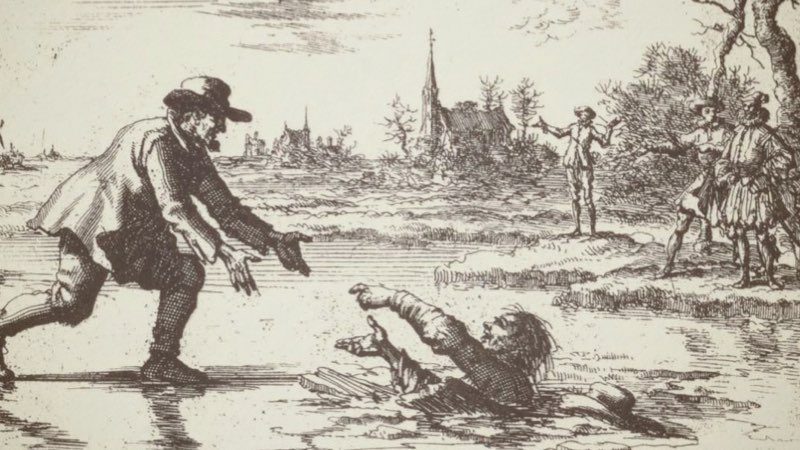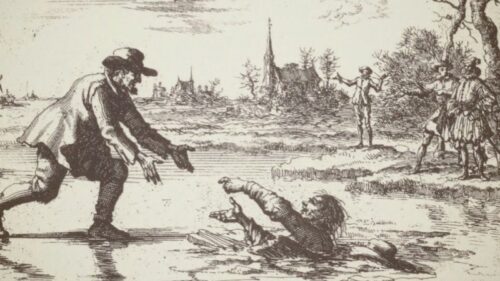
18. Of the False Church’s Claims (Part 4)
Conclusion of the Matters Here Related
We will now take leave of the popes, and let them pass. It is enough for us to know, that their succession, of which the papists boast so much, is confused and vain, or, at least, without tenable grounds. Plow we have proved this, is not for us to say; we let others judge.
This would be a proper time—in order to exhibit the highly renowned Latin church, the Roman Babylon, in her full form—to bring up from the bottom, and present minutely and in the best order, the manifold and implacable contentions which have arisen from time to time in, with, and among them, on matters of faith, although they have so much to say about their extraordinary unity: how the popes contended against the councils, and the councils against the popes; how one annulled and rejected what the other had made and instituted; yea, how they sometimes persecuted one another even unto death, and devoured and killed each other in the most cruel manner, even as though they were fighting with their avowed enemies; to say nothing of the great amount of superstition and human invention, [“But in vain they do worship me, teaching for doctrines the commandments of men,” saith the Lord. Matt. 15:9.] which, like horrible monsters and abortions, have proceeded, now by one, then by another, from the lap of the misnamed holy Roman church; for to treat of this, as the subject demands, would be almost an endless task, or, at least, require a whole book. What was once a comedy (with respect to the gay and merry regime of the papal dominion) has, through the beginnings of its downfall, been changed into a tragedy.
However, what we have shown, relates only to this present life; but the most mournful tragedy, according to the threatening of God (still we hope for the best), is yet to come, and concerns the future and eternal life. [Everything has its opposite: weeping is the opposite to laughing; wailing and mourning, to shouting and rejoicing; but in all this it is better to rejoice last than before. “Woe to thee that spoilest, and thou wast not spoiled; and dealest treacherously, and they dealt not treacherously with thee I when thou shalt cease to spoil, thou shall be spoiled; and when thou shalt make an end to deal treacherously, they shall deal treacherously with thee” (Isa. 33:1).]
Besides these most ungodly things which we have mentioned, they were drunk with the blood of the saints; yea, they did not only pour out as water the blood of the beloved friends and children of God, and cool their thirst for blood therewith, but, besides inconceivable cruelties, they heaped also the greatest ignominy upon their bodies, throwing them like mire upon the earth, or giving them to the beasts for food, or, on stakes and wheels, to the birds to devour. [“Judge not, that ye be not judged. For with what judgment ye judge, ye shall be judged; and with what measure ye mete, it shall be measured to you again” (Matt. 7:1, 2). “If any man have an ear, let him hear. lie that leadeth into captivity shall go into captivity: he that killeth with the sword must be killed with the sword” {Rev. 13:9, 10).]
God shall certainly visit this yet upon them, and not let it go unavenged. “He that toucheth you,” says Zechariah to the church of God, “toucheth the apple of his eye” (Zech. 2:8).
Oh, that they would become converted betimes! Oh, that they would anticipate the uplifted rod of the divine wrath! Oh, that they would fear, and escape, through genuine repentance, the fearful kindled fire of his everlasting displeasure, which the wicked and impenitent shall certainly incur. That meanwhile all those who are still imprisoned in Babylon, and sit in the darkness and shadow of death, would, for the preservation of their souls, flee out of her; that they would set out for Jerusalem, the spiritual vision of peace (understand, the true church of God); that they would seek their souls’ salvation while it is time, yea, that they would find, obtain and preserve it! This is certainly a thing to be wished for.
NOTE.—”Come out of her, my people, that ye be not partakers of her sins, and that ye receive not of her sins” (Rev. 18:4). These words as it appears are taken from the address of the prophet Jeremiah to the Israelites who were in bondage, in Babylon, saying as in a hasty and affrighted voice: “Flee out of Babylon, and deliver every man his soul; be not cut off in her iniquity; for this is the time of the Lord’s vengeance; he will render unto her a recompense” (Jer. 51:6). In like Manner men must also hastily come out of the spiritual Babel, out of the confusion and many corrupt, human forms of worship and vanities of the world. “Save yourselves from this un- toward generation” (Acts 2:40). “The Lord give thee understanding in all things” (II Tim. 2:7).
Thieleman J. Van Braght (1625-1664) was an Anabaptist who is best known for writing a history of the Christian witness throughout the centuries entitled “The Bloody Theater or Martyrs Mirror of the Defenseless Christians who baptized only upon confession of faith, and who suffered and died for the testimony of Jesus, their Saviour, from the time of Christ to the year A.D. 1660” (1660).
Thieleman J. Van Braght, Martyrs Mirror




